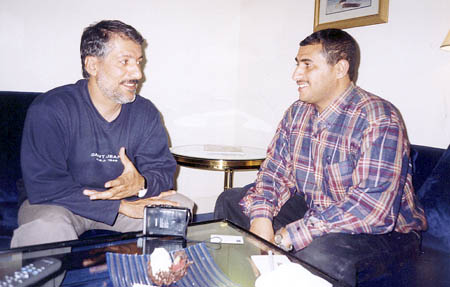The Human Declaration of Human Rights and Womens Rights [Archives:2001/50/Law & Diplomacy]
Suad Al-Gedsi
The Universal Declaration, it has been called, is the worlds best kept secret. Yet, it is one of the most important documents in history. The Universal Declaration was adopted by the UN in the wake of the horrors of World War II. Every December 10, human rights groups everywhere join to celebrate this accomplishment and reflect on the continued abuses of human rights around the world.
Human rights are much more than rights, human rights ensure our humanity. Freedom of thought, speech and expression are essential to human growth, development and fulfillment. Human rights are universal and inalienable. Across centuries, across civilizations, across religions, human rights have existed for all human beings.
University has been ensured in the Declaration of UN, Global Conferences in Vienna, Cairo, Copenhagen, Istanbul and Rome; human rights are independent. Thus, the right to food is related to the right to work, the right of the human to health, the right to social services, and most importantly, to the rights of women. In the context of international human rights, the legal concept of gender equality is enshrined in the 1984 Universal Declaration of Human Rights, as well as in the 1979 United Nation Convention on the Elimination of all Forms of Discrimination against Women. The Convention, which was ratified by more than 100 counties, including Yemen, states clearly and unequivocally that discrimination against woman violates the principle equality of rights and respect for human dignity. This Convention provides for womens civil rights and their legal equality in all fields. It is the only international human rights treaty to affirm the reproductive rights of women and to target culture and tradition as influential forces shaping gender roles, and to call for family national action to end discrimination. This multidimensional approach makes the Convention a landmark treaty in the struggle to end discrimination based on sex.
Some governments have adopted legal reforms in a vacuum, without actually involving those concerned or mobilizing public opinion. As a result, many women, particularly in the developing world, are not even aware of their rights before the law, or else do not understand the legal and administrative processes well enough to be able to exercise those rights.
Once critical advance in addressing violence against women has been the recognition by governments and communities that violence against women by private actors in the homes is a human rights violation. Laws holding perpetrators accountable should be strengthened and victims should be effectively protected, for example, by ensuring that marital rape is considered to be crime. Programs and policies that can help change attitudes and other practices to eliminate violence against women must be created. The other steps towards the elimination of discrimination and the empowerment of women lies in educating them about the existence and extent of their legal rights. It may be helpful to offer women free legal services to ensure protection of their rights.
Situations of war and armed conflict may be particularly devastating to women and increase the human rights violations they experience. The Vienna Declaration and Program of Action underscores the urgency for the governments to address human rights violations against women that occur in situations of armed conflict. It urges states to combat violence against women and notes that violations of the human rights of women in a situation of armed conflict are violations of the fundamental principles of international human rights and humanitarian law.
Finally, it is essential that men learn to recognize and respect women’s equality before the law. No fundamental change in favor of women is possible without a massive change in males attitude.
——
[archive-e:50-v:2001-y:2001-d:2001-12-10-p:./2001/iss50/l&d.htm]


